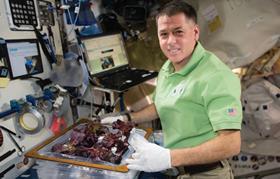
Astronauts and space tourists could soon enjoy fresh tomatoes, cabbage and, yes, even rocket that's quite literally out of this world, after a new study found that the first ever leafy vegetables grown in space were as tasty, safe and nutritious as anything produced back on terra firma.
The study's findings, which were published by the journal Frontiers in Plant Science, indicated that red romaine lettuce crops grown by Nasa scientists on board the International Space Station constituted 'safe, edible, fresh' food with the potential to supplement the astronauts' diets.
The lettuce was grown between 2014-16 using the Vegetable Production System, known as Veggie, which is described as a 'simple, low-power' system comprising two units, alongside a more sophisticated growth chamber called the Advanced Plant Habitat.
According to Gioia Massa, the project's lead scientist, growing fresh produce in space could provide essential nutrition for astronauts on long-distance missions in future.
“If you store packaged food for a long duration the quality, flavour and nutritional quality decrease, the vitamins degrade,” she told The Guardian. “We can’t guarantee that they’re going to get enough nutrition right now.”
Nasa has reportedly also grown a number of other items on board the ISS, including pak choi, dragoon lettuce, wasabi mustard and red Russian kale.
It has also conducted trial production of tomatoes back on the ground and is understood to be planning an extraterrestrial trial involving chilli peppers.



